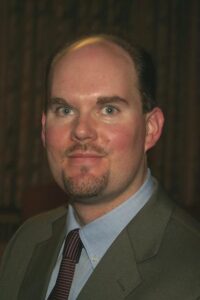Brian Lowe, SUNY Oneonta – Conspiracy Theories
 Conspiracy theories continue to run rampant in today’s public sphere.
Conspiracy theories continue to run rampant in today’s public sphere.
Brian Lowe, professor of sociology at SUNY Oneonta, looks into why.
Brian M. Lowe received his BAH and Master’s in Sociology from Queen’s University at Kingston, Ontario and his Ph.D. in Sociology from the University of Virginia. Dr. Lowe’s research and teaching interests include sociological theories, animal and society, cultural and comparative-historical sociology and spectacular conflicts. He is the author of Emerging Moral Vocabularies: The Creation and Establishment of New Forms of Moral and Ethical Meanings (Lexington books, 2006) and several articles. In 2008 Lowe became Chair of the Animals and Society section of the American Sociological Association.
Conspiracy Theories
Mark Twain allegedly said that “History doesn’t repeat itself, but it often rhymes.” If Twain were writing about the current flood of American conspiracy theories, he might add “and it stirs the pot.” The Republic has been periodically seized by conspiracy theories, ranging from fears of “others” in the American domestic sphere, like nineteenth century theories about the danger of “papist” influence through Catholic immigrants to fears of financial foreign influence from international British (and Jewish) bankers.
Occasionally powerful people promote conspiracy theories; others become powerful through promulgating conspiracy theories. In 1835 Samuel Morse, inventor of the telegraph, promoted a conspiracy theory that international elites including the Pope and the Chancellor of the Austrian Empire worked against the United States. In 1950 in Wheeling, West Virginia, Wisconsin Senator Joseph McCarthy shot to prominence by claiming– without evidence – that there were over 200 Communists active in the United States Government.
Others have become influential through promoting conspiracy theories without the benefits of worldly accomplishments or wealth. In the 1990s conspiracy theorist Alex Jones utilized cable access television in Austin, Texas to expand his conspiracy-themed program Infowars into an estimated peak 2.4 million subscribers on his YouTube channel and others on additional social media platforms and even a Press pass to the Republican National Convention in 2016. Conversely, verifiable conspiracies of harms inflicted on unsuspecting populations, including the lead-laden water crisis of Flint Michigan and the highly addictive OxyContin of Perdue Pharma, never received the equivalent outraged attention directed at fictions like the pedophile and satanic networks of QAnon.
In explaining the current deluge of conspiracy theories, we should look to the conspiratorial entrepreneurs promoting them. We must also remember a key insight of scholars of disinformation like Thomas Rid: misinformation may emerge from external sources, but audiences sustain and perpetuate them.



But what about “real” conspiracies – the plot against Hitler, for example?
The problem may stem from our misuse of words.
A “theory” is not a fantasy, a paranoid delusion, or and ideologically-driven attempt to construct a narrative that demonizes one’s enemies.
A theory, properly understood, is a statement or set of statements that attempts to explain demonstrable empirical “facts.” It takes information and attempts to interpret discrete pieces of data in terms of a broad correlation and, ideally causation.
While we have been taught by the likes of Ronald Reagan to claim that “evolution” and “creationism” have equal status as “just theories,” and therefore stand lower that “facts” in an epistemological hierarchy, we do ourselves and others a disservice by claiming “facts” and superior to “theories.”
It reminds me of the absurdity: “that’s OK in theory, but it won’t work in practice.”
NO! If it won’t work in practice, it is based on “bad” theory; and if it does work in practice, it is based on “good” theory. Nothing works in the “real world,” if it doesn’t “make sense” on what Bertrand Russell was pleased to call a higher “logical type” of statements.